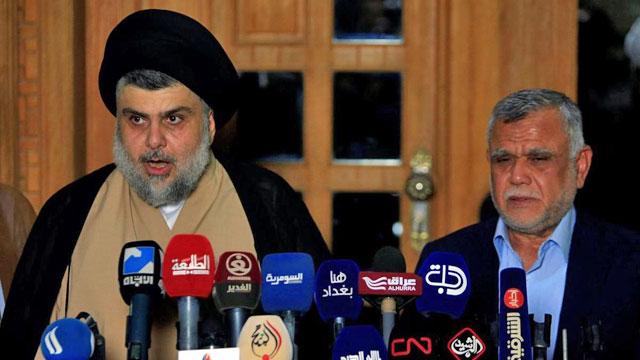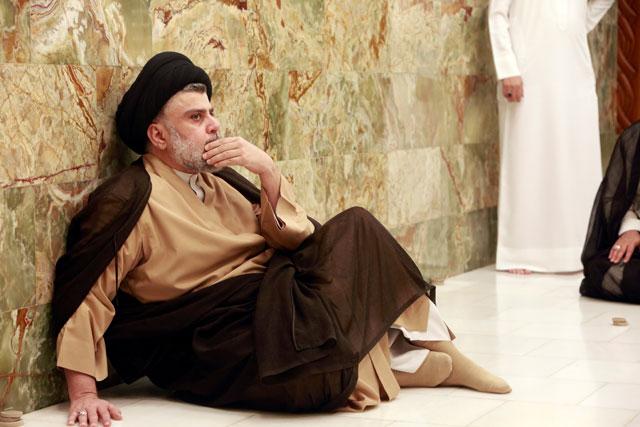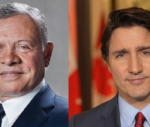You are here
Shiite rivalry paralyses Iraq’s government
By Reuters - Dec 04,2018 - Last updated at Dec 04,2018

Iraqi Shiite cleric Moqtada Al Sadr speaks during a news conference with leader of the Conquest Coalition and the Iran-backed Shiite militia Badr Organisation Hadi Al Amiri in Najaf, Iraq, on June 12 (Reuters photo)
BAGHDAD — A growing rivalry between two powerful Shiite Muslim factions has paralysed efforts to form a government in Iraq six months after an election aimed at steering the country towards recovery from years of war.
The two largest parliamentary groupings to emerge after the vote in May — one led by populist cleric Moqtada Al Sadr and the other by Iranian-backed militia leader Hadi Al Amiri — formed a tacit alliance in October when they picked a president and approved 14 out of 22 Cabinet ministers.
But since then there has been stalemate, mainly over the empty interior ministry post dominated for years by allies of Amiri, who are backing the former head of a paramilitary force supported by Tehran. Sadr meanwhile says no one with a political affiliation should get the post.
A vote in parliament to fill the vacant ministries in Prime Minister Adel Abdul Mahdi’s Cabinet has been repeatedly put back.
Iraq’s return to deadlocked parliamentary politics, now involving Shiite factions rather than the Sunni-Shiite sectarianism that followed the 2003 US-led invasion, prompted a plea last week from Iraq’s most senior Shiite cleric for politicians to work together.
That now looks all but impossible. As Grand Ayatollah Ali Al Sistani made his remarks, the two sides broke off talks, lawmakers said.
“We reached a dead end,” Hanin Qaddo, a member of the bloc led by Amiri, told Reuters on Friday.
“There’s no need for more delays, no use in talks,” MP Ahmed Al Kinani said. “We will go to parliament and vote for the rest of the Cabinet.”
He said they would do this without agreement from Sadr’s supporters even though the parliamentary arithmetic is against them.
Sadr on Monday urged Abdul Mahdi to present the rest of his Cabinet to parliament for approval as soon as possible, without disputed candidates. “You must not submit to what is going on behind the scenes,” Sadr told the prime minister.
Sadr, whose alliance won the most parliamentary seats in the election, has threatened to walk out of the political process and stage mass demonstrations as he has done in the past, notably when protesters stormed Baghdad’s fortified Green Zone in 2016.
“If Bina [Amiri’s bloc] ignores us then we will resort to all possible options including mobilising the street,” said a member of Sadr’s alliance, who declined to give his name.
‘There’s no reconstruction’
Whether Sadr’s walk-out is imminent or not, the confrontation is paralysing efforts to rebuild a country wrecked by its war with Daesh and provide services in poor areas.
Flash floods killed several people last month, and militants still stage small-scale attacks. Local officials blame political infighting for failure to deliver services.
“There’s no reconstruction or jobs here,” said Sheikh Abu Mashan, a tribal leader in Anbar province.
“Main electricity lines are still down. At first they said we’d get power by October. Now they say January. Authorities have no interest in us — they’ve spent nearly seven months talking and still have no government.”
The deadlock also means a 2019 budget has not been passed, so provinces do not know how much they will have to spend on fixing services.
“Heavy rainfall cut roads out of Mosul,” governor official Nouruddin Catalan said. “We don’t even have enough money to fix roads damaged by fighting.”
Abdul Mahdi was seen by many parties as a compromise candidate for the post of prime minister who might form a government of independent technocrats capable of delivering services and reducing unemployment, the causes of protests that turned violent in September.
He was approved by both parliamentary groupings, which include Sunni parties. Sunnis and Kurds also hold Cabinet posts.
But the power struggle between Sadr and Amiri has removed the initiative from the prime minister’s hands, and away from parliament, analysts say.
“It’s not up to him and it’s not up to the parliamentarians — neither the executive nor the legislative branches of government have a say in forming the next Cabinet,” said Renad Mansour, a research fellow at Chatham House, a London think tank.
“There’s no leader yet who’s able to sit the two sides together and get to the bottom of who will be interior [minister]... it’s become a matter of principle.”
These divisions among Shiite leaders could weaken Iranian influence in Iraq, which has grown since the overthrow of Saddam Hussein 15 years ago.
If the split persists, Iran would prefer to see Amiri and his fellow militia leaders in a strong position. But while Iran will try to stop the divisions getting any worse, there is no sign yet that it has mediated between the two factions.
Premier’s time
running out?
Lawmakers from Sadr’s parliamentary group said they sent a message last week to Amiri’s candidate for interior minister, Falih Al Fayyadh, the former head of a grouping that comprises Iraq’s Shiite militias, asking him to step down.
MPs in Amiri’s bloc told Reuters they would try to push Fayyadh through parliament after giving up on talks with the Sadists. Without agreement from Sadr, however, the vote is unlikely to pass, putting further pressure on Abdul Mahdi’s crisis-hit government.
“Despite the difficulties the prime minister is facing in nominating interior and defense ministers, he should complete this formation and present names. Otherwise his government cannot really continue like this,” said Dhiaa Al Asadi, a top adviser to Sadr.
The defence ministry is also in play, but the interior post is the main sticking point.
Asadi said Sadr would give Abdul Mahdi up to six months to form a full Cabinet before withdrawing support.
Pressure is also coming from Amiri’s side.
“If Abdul Mahdi is convinced... that Fayyadh is the right candidate, he needs to present him,” said Qais Al Khazali, a militia leader whose political wing has contributed lawmakers to Amiri’s bloc.
“The prime minister doesn’t currently have a majority bloc in parliament that would support his government for four years,” Khazali said.
Related Articles
KIRKUK, Iraq — One person was killed in Iraq’s Kirkuk on Sunday when a suicide car bomb went off near a storage site housing ballot boxes fr
SULAIMANIYA, Iraq/BAGHDAD — Iraq’s new Prime Minister Adel Abdul Mahdi was sworn in on Wednesday with only a partial Cabinet after lawmakers
BAGHDAD — Nationalist cleric Moqtada Al Sadr, a long-time adversary of the United States, led in Iraq’s parliamentary election with more tha














